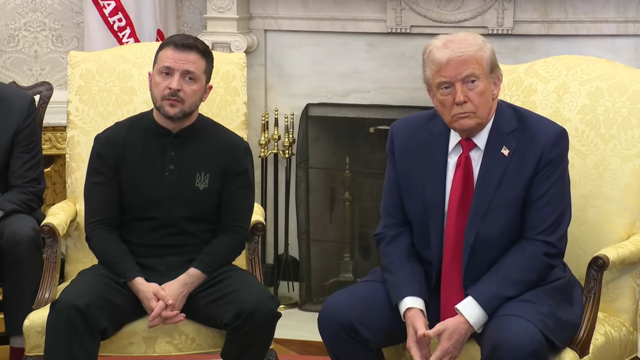President Donald Trump has ordered a temporary freeze on military aid to Ukraine, citing concerns over President Volodymyr Zelensky's "commitment to peace" following a heated confrontation between the two leaders in the Oval Office, a White House official told CNN on Monday.
"The president has been clear that he is focused on peace," the official said. "We need our partners to be committed to that goal as well. We are pausing and reviewing our aid to ensure that it is contributing to a solution."
The freeze applies to all military assistance not yet inside Ukraine and is part of what administration officials describe as a pressure campaign to push Zelensky toward negotiations with Russian President Vladimir Putin. Trump and his advisors are also seeking an acknowledgment from Zelensky-potentially a public apology-for his behavior during the Oval Office meeting before resuming discussions on aid or a minerals-for-security deal that was reportedly near completion before the meeting unraveled.
Zelensky's refusal to endorse the terms of that deal, which lacked explicit security guarantees for Ukraine, was a key point of contention during the encounter. "We cannot just sign an ... agreement without any substantial guarantees," a Ukrainian defense official told Fox News. "It's not going to work. It's just going to reward the aggressor."
During the meeting, Trump accused Zelensky of "gambling with World War Three" for resisting pressure to engage in peace talks with Russia. The Ukrainian president pointed out that Russia has consistently violated past agreements, including during Trump's first term, and said he could not accept a deal that lacked firm protections against future aggression.
The fallout from the meeting has been significant. Secretary of State Marco Rubio has publicly urged Zelensky to apologize for the exchange, telling CNN that the Ukrainian leader must demonstrate he is a "serious partner" in the search for peace.
Trump's decision to halt aid marks a stark shift in U.S. policy and puts him at odds with key European allies, including Britain and France, which reaffirmed their support for Ukraine during a summit in London over the weekend.
"This is a critical time for Ukraine," said Sen. Susan Collins (R., Maine), one of the few Republican voices pushing back against Trump's stance. "We should not be pausing our efforts. It's the Ukrainians who are shedding blood."
Other Republicans, however, have signaled support for Trump's move. Sen. Markwayne Mullin (R., Okla.) said the American public is weary of funding a war with no clear end in sight. "I don't believe that any of us sitting here believes that Ukraine can win this war," he said. "The president is saying, 'Let's bring an end to it.'"
The Pentagon had continued supplying weapons to Ukraine under existing drawdown authorities, but those shipments will now be frozen. That includes anti-tank weapons, thousands of artillery rounds, and rockets that were previously in transit.
An American defense official warned that while the impact of the aid pause might take weeks to materialize on the battlefield, Ukraine's military will soon face significant shortages if additional weapons do not arrive. "There is a capability gap that Europe cannot fill alone," the official said.
House Foreign Affairs Chair Rep. Brian Mast (R., Fla.) said he was aware that pausing U.S. military assistance to Ukraine was an option under consideration by the Trump administration. "I knew it was an option," Mast told CNN. "I think people can assume that everything is on the table with Ukraine right now."
Trump, who has increasingly echoed Russian rhetoric by falsely claiming Ukraine started the war and calling Zelensky a dictator, suggested Monday that U.S. support could resume under certain conditions. Asked about the minerals deal, he told reporters that he would address the matter during his upcoming address to Congress.
"I just think he should be more appreciative," Trump said. "This country has stuck with him through thick and thin. We've given them much more than Europe, and Europe should have given more than us because, as you know, that's right there, that's the border."






